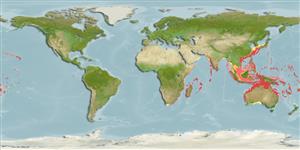Environment: milieu / climate zone / depth range / distribution range
экология
морской ассоциированный с рифами; пределы глубины 4 - 131 m (Ref. 9710), usually 9 - 130 m (Ref. 27115). Tropical; 24°C - 28°C (Ref. 27115); 40°N - 37°S, 17°E - 155°W
Indo-Pacific: East Africa (including the Mascarene Islands, Ref. 37792) to the Hawaiian and Line islands, north to southern Japan, south to Rowley Shoals, southern Great Barrier Reef and Lord Howe Island. Absent from most of central Pacific.
Size / Вес / Возраст
Maturity: Lm ? range ? - ? cm
Max length : 54.0 cm TL самец/пол неопределен; (Ref. 3145); common length : 35.0 cm TL самец/пол неопределен; (Ref. 3146); наибольший возраст (опубликованны данные): 30 годы (Ref. 127555)
колючие лучи спинного плавника (общее число) : 9; членистые (мягкие) лучи спинного плавника (общее число) : 25 - 27; колючие лучи анального плавника: 3; членистые (мягкие) лучи анального плавника: 24 - 26. Pale brown body; broader, irregular lines on head; orange band between eyes, continued behind each eye to gill cover. Each side of caudal peduncle with single, sharp, forward-pointing erectile spine; spine largely covered by cream sheath; groove surrounded by a black area. Dorsal fin with soft part having longer base than spinous part. Minute scales. Gill rakers 22-26 in anterior row, 23-27 in posterior row. Caudal fin lunate in adults (Ref. 1602).
Schooling species, usually occurring in seaward reefs at depths greater than 9 m (Ref. 1602). Adults mainly on deep coastal reef slopes and outer reef walls, often on deep shipwrecks. Juveniles found on algae-rocky reef (Ref. 48637). Benthopelagic (Ref. 58302). Occur singly or in groups (Ref. 37816). Feed on surface film of fine green and blue-green algae, diatoms, and detritus covering sand (Ref. 1602). Pair-spawner (Ref. 37816). Mainly diurnal. (Ref. 1602). Utilized as a food fish (Ref. 3146).
Life cycle and mating behavior
Maturities | размножение | Spawnings | Egg(s) | Fecundities | личинки
Probably spawn in pairs (Ref. 240).
Randall, J.E., 1986. Acanthuridae. p. 811-823. In M.M. Smith and P.C. Heemstra (eds.) Smiths' sea fishes. Springer-Verlag, Berlin. (Ref. 3145)
Статус Красного Списка МСОП (Ref. 130435)
Использование человеком
рыболовство: не имеет хозяйственного значения; аквариум: коммерческий
дополнительная информация
инструменты
Специальные отчеты
Скачать в формате XML
ресурсы в Интернет
Estimates based on models
Preferred temperature (Ref.
123201): 20.3 - 28.9, mean 27.2 °C (based on 2904 cells).
Phylogenetic diversity index (Ref.
82804): PD
50 = 0.5000 [Uniqueness, from 0.5 = low to 2.0 = high].
Bayesian length-weight: a=0.03020 (0.01872 - 0.04873), b=2.94 (2.80 - 3.08), in cm total length, based on LWR estimates for this species & Genus-body shape (Ref.
93245).
Trophic level (Ref.
69278): 2.0 ±0.00 se; based on food items.
Generation time: 3.7 ( na - na) years. Estimated as median ln(3)/K based on 1
growth studies.
устойчивость к внешним воздействиям (Ref.
120179): низкий, минимальное время удвоения популяции 4.5-14 лет (tmax=28; K=0.29).
Fishing Vulnerability (Ref.
59153): Moderate vulnerability (36 of 100).
Nutrients (Ref.
124155): Calcium = 40.3 [16.1, 111.2] mg/100g; Iron = 0.653 [0.253, 1.583] mg/100g; Protein = 18.2 [16.8, 19.4] %; Omega3 = 0.105 [0.048, 0.219] g/100g; Selenium = 25.9 [8.9, 76.2] μg/100g; VitaminA = 31 [7, 131] μg/100g; Zinc = 2.38 [0.75, 4.33] mg/100g (wet weight);
